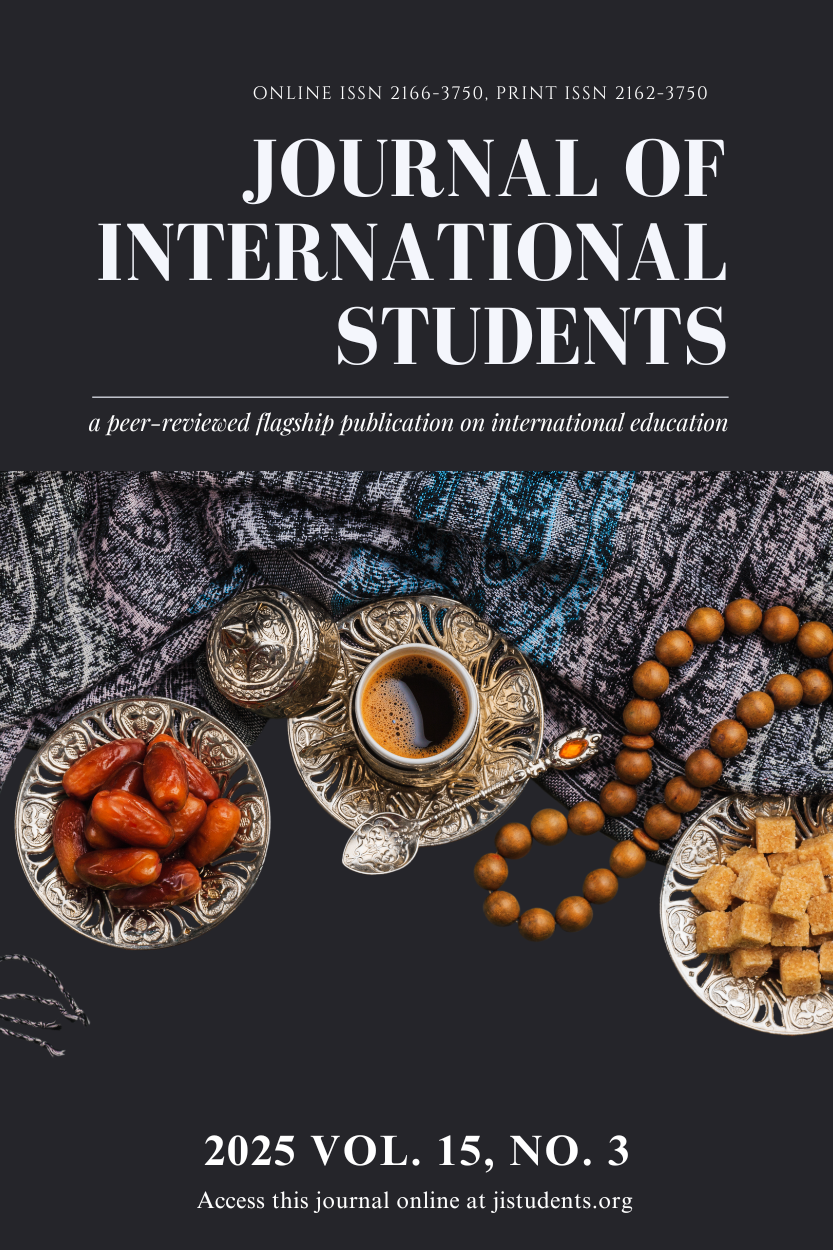Exploring intercultural competence
A case study of an Indonesian Muslim doctoral student in Australia
DOI:
https://doi.org/10.32674/628yr447Keywords:
Appraisal, intercultural competence, narrative case study, transitivityAbstract
This study explores the development of intercultural competence through the lived experience of an Indonesian doctoral Muslim student pursuing higher education in Australia. We employ a narrative inquiry case study approach; the research delves into the participant's personal and academic journey, examining how intercultural interactions in a foreign educational environment shape their understanding and adaptation to cultural differences. The analysis focuses on the linguistic and experiential aspects of the students' narrative, using transitivity analysis to investigate the processes, actions, and experiences the student describes during their intercultural encounters. Additionaly, language appraisal is employed to assess the student's emotional responses, attitudes, and evaluations of intercultural situations. This dual analysis provides a comprehensive view of how intercultural competence is constructed and navigated in a cross-cultural context. The findings highlight the dynamic interplay between cultural identity, language, and academic adaptation, offering insights into how students from Indonesia develop intercultural skills in international settings.
References
Andreana Pastena, Albert Sesé & Mireia Trenchs-Parera (2024) Impact of plurilingualism and previous intercultural experience on undergraduates’ intercultural sensitivity at the start of university studies, Journal of Multilingual and Multicultural Development, 45 (5), 1662-1674, DOI: 10.1080/01434632.2021.2013854
Astley, M. (2024). Cross-cultural challenges faced by international students: A case study of Indian postgraduate students at a London-based business school. Journal of International Students, 14(4), 971-988. https://doi.org/10.32674/jis.v14i4.6765
Austin, A. E. (2002). Preparing the next generation of faculty: Graduate school as socialization to the academic career. The Journal of Higher Education, 73(1), 94–122. https://doi.org/10.1353/jhe.2002.0001
Braun, V., & Clarke, V. (2006). Using thematic analysis in psychology. Qualitative Research in Psychology, 3(2), 77-101. https://doi.org/10.1191/1478088706qp063oa
Clandinin, D. J., & Connelly, F. M. (2000). Narrative inquiry: Experience and story in qualitative research. San Francisco: Jossey-Bass.
Cotterall, S. (2011). Doctoral students writing: Where's the pedagogy? Teaching in Higher Education, 16(4), 413–425. https://doi.org/10.1080/13562517.2011.560381
Creswell, J. W., & Poth, C. N. (2018). Qualitative Inquiry and Research Design: Choosing Among Five Approaches (4th ed.). SAGE Publications.
Deardorff, D. K. (2006). The identification and assessment of intercultural competence as a student outcome of internationalization. Journal of Studies in International Education, 10(3), 241-266.
Feng Teng (2019): A narrative inquiry of identity construction in academic communities of practice: voices from a Chinese doctoral student in Hong Kong, Pedagogies: An International Journal, DOI: 10.1080/1554480X.2019.1673164
Halliday, M. A. K., & Matthiessen, C. M. I. M. (2014). Halliday's Introduction to Functional Grammar (4th ed.). Routledge.
Harrison, M., & Le, T. (2020). Indonesian international students in Australia: Academic experiences and support needs. Advances in Education in Diverse Communities, 16, 1-20.
Hastowohadi, & Ma’rifatulloh, S. (2025). Equality in Indonesian higher education for international students: A narrative inquiry. Journal of International Students, 15(1), 87-106. https://doi.org/10.32674/h4tmp642
Kim, S. (2024). Subjective well-being of international students: Interplay of perceived discrimination, health status, and community satisfaction. Journal of International Students, 14(4), 570–590.
https://doi.org/10.32674/jis.v14i4.6480
Martin, J. R., & White, P. R. R. (2005). The language of evaluation: Appraisal in English. Palgrave Macmillan.
McAlpinea, L., & Amundsen, C. (2009). Identity and agency: Pleasures and collegiality among the challenges of the doctoral journey. Studies in Continuing Education, 31(2), 109–125.
Montgomery, C. (2010). Understanding the international student experience. Palgrave Macmillan.
Novera, I. A. (2004). Indonesian postgraduate students studying in Australia: An examination of their academic, social and cultural experiences. International Education Journal, 5(4), 475-487.
Skyrme, G. (2007). Entering the university: The differentiated experience of two Chinese international students in a New Zealand university. Studies in Higher Education, 32(3), 357–372.
Spitzberg, B. H., & Changnon, G. (2009). Conceptualizing intercultural competence. In D. K. Deardorff (Ed.), The SAGE handbook of intercultural competence (pp. 2-52). SAGE.
Wright, T., & Cochrane, R. (2000). Factors influencing successful submission of PhD theses. Studies in Higher Education, 25(2), 181–195.
Yin, R. K. (2014). Case study research: Design and methods (5th ed.). SAGE.
Downloads
Published
Issue
Section
Categories
License
Copyright (c) 2025 Journal of International Students

This work is licensed under a Creative Commons Attribution-NonCommercial-NoDerivatives 4.0 International License.
All published articles are licensed under a Creative Commons Attribution-NonCommercial-NoDerivs 4.0 Unported License.















